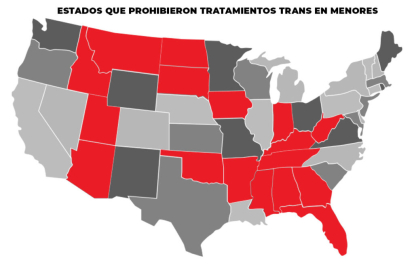These are the states that have banned transgender treatment of minors
Most laws penalize medical providers who prescribe hormone treatments and perform gender reassignment surgery.

(Pexels)
In the U.S., at least 19 states have already enacted laws restricting or prohibiting gender transitions in minors. Among them: Alabama, Arkansas, Arizona, North Dakota, South Dakota, Florida, Georgia, Idaho, Indiana, Iowa, Kentucky, Mississippi, Missouri, Montana, Oklahoma, Tennessee, Texas, Utah and West Virginia.
Some federal judges have blocked the implementation of such rules in Alabama and Arkansas. Meanwhile, many bills are still being considered by legislators in other states. One of these states is Nebraska, which stepped forward to join this list this Friday.
Nebraska's unicameral legislature passed the "Let Them Grow Act," which restricts these procedures on minors under 19 years of age and also prohibits abortion past 12 weeks. Republican Governor Jim Pillen said he plans to sign the "Let Them Grow Act." This new bill contains an emergency clause, which will make the restrictions on abortion effective the moment the governor signs it. For sex reassignment operations, the measures will become effective in October. After the act was passed in the Nebraska Senate, rallies were held by trans activists in rejection of the bill.

States that prohibit transgender treatments in minors (Voz Media).
The main prohibitions in the laws include prison and monetary penalties for health care providers or physicians who administer puberty blockers and hormone therapies to minors, as well as penalizing those who perform sex change surgeries on children.
Below are the states that have banned sex reassignment procedures for minors.
Alabama
Alabama was the third state in the country to approve a law restricting children under 19 from receiving transgender medical treatment. It also became the first to impose criminal penalties on those who fail to comply with the rule, making it a serious offense for medical professionals to provide sex reassignment care to young people or children.
Part of this legislation was challenged in a Federal Court. Therefore, the clause prohibiting puberty blockers and other hormones for minors is not currently being enforced. However, the federal judge did leave in place the ban on reassignment surgeries.
Arkansas
Arkansas became the first state in the nation - in April 2021 - to prevent minors from receiving medical sex change treatments (hormone therapies and surgeries). The congressmen began a legal battle when the proposal -previously approved by Congress- was vetoed by then-Governor Asa Hutchinson, who considered the text "out of order."
Subsequently, lawmakers overrode Hutchinson's veto, allowing the rule to pass. As in Alabama, this law was challenged in Federal Court in 2023, thus blocking its implementation.
However, in March of this year, current Governor Sarah Huckabee Sanders signed a bill into law that will make healthcare providers serve up to 15 years in prison if they perform a gender transition procedure on a child under 18.
In June 2023, U.S. District Judge Jay Moody issued a permanent injunction against the first 2021 law (passed by Hutchinson) and ruled that it is unconstitutional as it violates First Amendment rights:
ACT274 by Verónica Silveri on Scribd
Arizona
In March 2022, then-state Governor Doug Ducey signed a law stating that "a physician may not perform irreversible gender reassignment surgery on any person under the age of eighteen." That is, the law prohibits the performance of gender transition surgeries on minors.
Earlier this year, current Governor Katie Hobbs called the rule a "hatchet job on civil rights."
SB1138P by Verónica Silveri on Scribd
North Dakota
Governor Doug Burgum signed a bill into law that prevents transgender medical care for minors. The rule bans puberty blockers, hormones and sex reassignment surgery.
The measure -which was approved on an emergency basis - states that it is a crime to provide gender reassignment treatment to minors under 18 years of age and allows prosecutors to charge a healthcare provider with a felony offense (up to 10 years in prison and $20,000 in fines) for performing sex reassignment surgery on a minor.
It also allows them to charge a physician with a misdemeanor (up to 360 days in jail and $3,000 in fines) for prescribing gender-affirming drugs - such as puberty blockers - to a child.
Despite the penalties, the rule allows minors already receiving treatment before its implementation on April 19, 2023, to continue with them.
23-0869-02000 by Verónica Silveri on Scribd
South Dakota
In February 2023, Governor Kristi Noem signed a law banning all so-called "gender-affirming care" for minors. This encompasses both gender reassignment surgery and chemical "treatments," including puberty blockers and hormones.
The regulation prohibits state health professionals from performing or administering gender reassignment treatments on minors. If a provider violates the law, the relevant licensing board will revoke their certificate.
Florida
Sex change surgeries and puberty blockers will be illegal for those under 18 in the state. Healthcare professionals who violate this regulation could even lose their medical license. These measures were established by a series of rules approved by Governor Ron DeSantis.
There may be exceptions, although this will depend on the opinion of the Board of Medicine and the Board of Osteopathic Medicine. Those would be for minors who had started treatment before the law came into force but not without prior parental consent. The standard also reserves a few paragraphs for adults. Those who want to expose themselves to these treatments must first be informed about their risks and irreversible consequences.
Georgia
The state banned gender reassignment surgeries and hormone treatments for people under the age of 18 as of July 1, 2023.
The congressmen gave their approval to Senate Bill 140. It was subsequently signed privately by Governor Brian Kemp.
The rule specifically prohibits "certain surgical procedures for the treatment of gender dysphoria in minors from being performed in hospitals and other licensed health care facilities" and has some exceptions for treatments deemed "medically necessary."
20232024-218904 by Verónica Silveri on Scribd
Idaho
On April 4, 2023, Governor Brad Little signed a bill into law that prohibits minors from receiving puberty blockers, hormones and transgender surgery.
It also penalizes professionals who provide care to young people to change their gender. It expressly makes it a felony for anyone to provide hormones, puberty blockers or other gender affirming medical care to minors.
The law will become effective on January 1, 2024.
H0071E1 by Verónica Silveri on Scribd
Indiana
Governor Eric Holcomb signed a bill into law that will prohibit young people from accessing transgender medication or surgery. In addition, it will require those who are taking hormone medication to stop taking it before the end of the year.
The rule went into effect July 1, 2023. However, federal Judge James Patrick Hanlon blocked a significant portion of the bill, excluding the ban on gender reassignment surgeries. The future of the law will be decided in court.
SB0480.05.ENRH by Verónica Silveri on Scribd
Iowa
In March, Governor Kim Reynolds signed a bill into law that prohibits minors from receiving treatment - including surgery - for gender reassignment.
The rule also prevents health care professionals from administering treatment "for the purpose of attempting to alter the appearance or affirm the perception of the gender or sex of the minor, if such appearance or perception is inconsistent with the sex [at birth] of the minor." Professionals who violate the law may be sued.
As with other states' laws, there are some exceptions, including a "medically verifiable disorder of sexual development."
SF538_GovLetter by Verónica Silveri on Scribd
Kentucky
Gov. Andy Beshear had vetoed a bill from the Senate that included a ban on puberty blockers, hormone therapy and surgery for minors.
However, the state Congress overrode the veto in March 2023. Therefore, the law becomes effective at the end of June of this year.
SB150_VO by Verónica Silveri on Scribd
Mississippi
In February 2023, Governor Tate Reeves signed a law that makes it a criminal act to provide medical care related to sex change to minors, frees health insurance companies from having to cover gender affirmation-related medical care for minors, and blocks public funding for clinics and institutions that provide this type of medical care.
The law also allows patients to sue clinics that perform these operations up to 30 years after the fact and explicitly prohibits puberty blockers, hormones and surgery for minors.
Missouri
In June 2023, Governor Mike Parson signed into bill The Safeguarding Adolescents from Experimentation (SAFE) Act, which prevents gender transition surgeries or the prescription of gender transition drugs for children under the age of 18:
The rule also prohibits the state's Medicaid program from funding gender transition surgeries, cross-sex hormones or puberty blockers.
Missouri SB49 by Santiago Adolfo Ospital
Montana
In April 2023, Governor Greg Gianforte signed a bill into law that will ban gender reassignment medical care for minors. It will become effective on October 1, 2023.
The rule prevents the performance of surgical procedures and the use of medications, such as puberty blockers. As with other state laws, the ban has exceptions, including for someone "diagnosed with a disorder of sexual development."
Any physician who performs a prohibited procedure can be sued within 25 years if side effects result in any injury, "including physical, psychological, emotional or physiological damage."
SB0099_X by Verónica Silveri on Scribd
Oklahoma
The state prohibits sex reassignment medical care for minors. This month, Governor Kevin Stitt signed a bill into law making it a felony for healthcare workers to provide children with these treatments, including puberty blockers and hormones.
The law became effective immediately.
SB613 ENR by Verónica Silveri on Scribd
Tennessee
In March 2023, Governor Bill Lee signed a group of bills banning surgery, hormones and puberty blockers in minors. Weeks earlier, the bill had passed the state Congress with an overwhelming majority. It also establishes penalties for treatment providers who violate it.
After Lee's signature, parents of some trans children filed a lawsuit against the state to prevent the rule from being enforced. In response, a federal district court judge ruled that it was unconstitutional on the grounds that it was discriminatory on the basis of sex. As a result, the law never went into effect.
However, a ruling by the Sixth Circuit Court of Appeals determined that the law would apply immediately in July 2023.
Texas
In June 2023, Governor Greg Abbott signed SB14, which prohibits minors from undergoing gender-affirming treatments which include aggressive hormone therapies, puberty blockers and genital mutilation surgeries.
Texas is now the most populated state in the country to protect children from these procedures. No one under 18 years of age will be able to undergo this type of intervention as of September 1, the date on which the law goes into effect.
Utah
In January 2023, Governor Spencer Cox signed a bill into law imposing a series of restrictions on so-called "gender-affirming" medical practices on minors.
The rule prohibits health care providers from "performing sexually characteristic surgery on a minor for the purpose of effecting a sex change and prohibits hormonal transgender treatment" on minors not diagnosed with gender dysphoria before July 1, 2023.
Enrolled by Verónica Silveri on Scribd
West Virginia
Governor Jim Justice approved a bill prohibiting minors under 18 from being prescribed hormone therapy, puberty blockers, and gender reassignment surgeries.
Unlike measures in other states, this one contains an exception: it allows physicians to prescribe hormone therapy - puberty blockers and others - if an adolescent is deemed at risk of self-harm or suicide and after receiving parental consent, as well as a diagnosis of severe gender dysphoria from two physicians, including a mental health professional.
The law will become valid in January 2024.
RECOMMENDATION





















